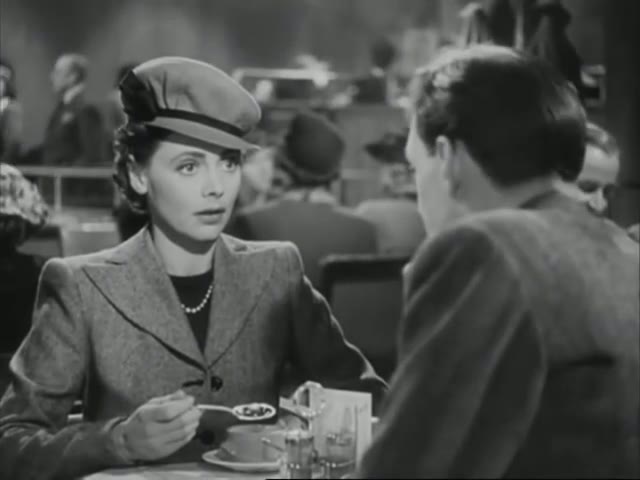Reżyseria:
David LeanZdjęcia:
Robert KraskerObsada:
Celia Johnson, Trevor Howard, Stanley Holloway, Joyce Carey, Alfie Bass, Margaret Barton, Sydney Bromley, Jack May, Irene Handl, Wallace Bosco (więcej)Opisy(1)
Laura (Celia Johnson) is a seemingly happy, middle-class housewife who meets the equally married physician Alec (a young Trevor Howard in only his third screen role) when he removes a speck of dust from her eye at a London railway station. The pair soon find themselves drawn together through weekly meetings at the station cafe, their casual encounters blooming into a chaste love affair marked by intimate conversation, longing glances--and the tragic realization that neither of them will be able to break the bonds of social propriety that keep them wedded to other people. (oficjalny tekst dystrybutora)
(więcej)Recenzje (4)
If there is any reason to watch this film, that would be mainly Celie Johnson’s performance. One long look at her unusual face, accompanied by her inner monologue, and she had me completely wrapped around her finger. I won't deny that I expected a little more from one of the most iconic romances, perhaps a stronger spark between the two protagonists, but the fact that they don't fall into each other's arms and shed crocodile tears in every other scene only adds to the sensitivity and believability of the film as a whole. I would have liked a more emotional ending, perhaps, but whatever, it was very good.
()
“Thank you for coming back to me.” Lean’s thoroughly British romance is the right opposite of the trashy melodrama Flames of Passion, which the protagonists disgustedly watch in a cinema (and don’t even stay until the end). The restrained style, which employs long shots, slow dissolves and minimum details, reflects the nature of the relationship between Laura and Alec. From the opening minutes of the film, society (of others) prevents them from finding happiness. Because they are bound by conventions and Christian morality, they cannot fully give themselves over to their passion (for which they seek substitutes in cheap films and pastries, which Alec refers to as “one of my earliest passions”). As an (un)happily married wife and mother of two, Laura is condemned to live through (and for) others rather than for herself and to feel guilty for something that she has not yet decided to do. Until she met Alec, she had never had a moment for herself; no one was interested in her desires and needs. Thanks to her new friend, she again learns to share (joy and laughter) and replaces subordination with the balance of a relationship. Despite its conservative tone, the film is relatively modern, as it boldly takes feminine subjectivity into consideration (both visually and with sound). Thrown into disarray by the affair, which peculiarly began at a place of perpetual comings and goings and fleeting encounters, Laura realises that her whole life does not belong to her husband. When she speaks to him with her inner voice, she is also addressing her thoughts to the viewer, from whom, as from her husband, she requests understanding and forgiveness. A characteristic aspect of her commentary is the attempt to rationalise the decisions that she has made and to make sense of her experience by retelling it. Thanks to the retrospective narrative, the film manages throughout its runtime to keep a slight distance from the events (for example, the first kiss is filmed in its entirety), which is balanced, however, by subjective scenes of intense emotional motives (the expressive tilt of the camera in the conclusion). Together with the sparing use of classical music (Rachmaninov) and the interspersion of the main storyline with comical episodes with strong supporting characters, the tension between maintaining distance and giving in to emotions helps to superbly bring rhythm to the film, which is not only short, but is also fast-paced, despite being part of a genre with tendencies toward immoderation. The length of the film corresponds to its original title and also reflects the brief time that Laura and Alec spent together. If you do not wish that the film would not have to end and that they could be together longer, you can congratulate yourself on the fact that you were not touched by one of the purest (in terms of genre) and narratively most brilliant romantic films of all time. 85%
()
Laura initially mutters to herself to the nosy gossip, "I wish you'd stop talking." and I kept repeating the same thing to her in my head like a mantra. Her amazingly descriptive inner monologue is exactly the kind of book-radio-theatre redundant stuff that has no business on a screen where you're telling a story in pictures. It's an annoying element, not well-written, superfluous (Celia Johnson basically plays everything she says with her eyes anyway), and outdated by the time it was made. Add to that the fact that the uncharismatic Trevor Howard, here a seemingly charming individual, is rolled by Celia's acting in every scene like an ignorant pupil at the blackboard. Yet the film flows, looks good, and everyone else acts well, even if it doesn't work on an emotional level.
()
When I approached the movie with the idea that it is a romantic film from the post-war era, I wasn't quite sure what to expect. The result took my breath away. I haven't seen a romantic movie in a long time where the central couple would be so perfect, moreover destined to end badly. A magnificent film and it's no surprise that it's from Great Britain.
()

